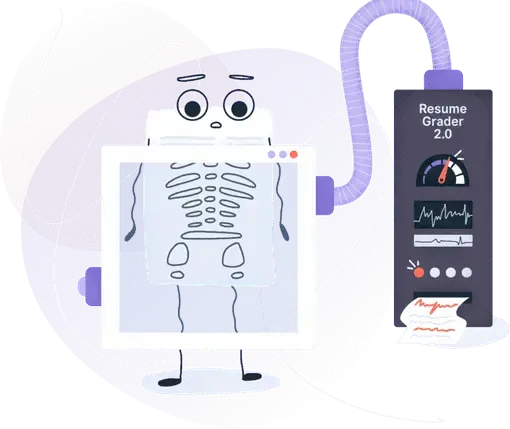Analytical Thinking Skills for a Resume: A Complete Guide in 2025
Frame your analytical thinking as the compass guiding you to career growth.


Is your resume ATS-friendly?
Drop your resume here or upload a file to find out if the skills in your resume are readable by an ATS.
Imagine being the person everyone turns to when a tough decision needs to be made, a problem solved, or data deciphered. That’s the power of analytical skills. They’re highly valued in today's job market.
According to the World Economic Forum's Future of Jobs Report 2023, analytical thinking ranks as the top core skill recognized by the majority of companies, constituting on average 9.1% of the core skills reported by companies.
This underlines why it’s so important to include your analytical skills on your resume. In this guide, we’ll share practical strategies to feature these abilities on your 2025 resume.
Before diving deeper, here’s a quick look at the main highlights.
Key takeaways
- Analytical thinking is a must-have skill in today’s information-centric job market.
- Highlighting this ability effectively can set you apart, especially in roles requiring problem-solving and data-driven insights.
- Combine soft and hard analytical skills, such as critical thinking and tools like Tableau or Python, for a well-rounded resume.
- Quantify your analytical skills with measurable outcomes.
- Tailor your resume to the job description by matching your skills to the role’s specific requirements and keywords.
- Certifications like Tableau Desktop Specialist or Google Data Analytics can strengthen your resume and showcase expertise.
Let’s break down the analytical thinking skills that can make your resume stand out.
What are analytical skills for a resume?
Analytical skills on a resume illustrate your ability to evaluate information, solve problems, and make data-driven decisions.
Analytical thinking encompasses technical abilities like data analysis and trend forecasting, as well as soft skills like logical reasoning and attention to detail. Together, these traits enable you to approach challenges methodically, explore solutions thoroughly, and contribute meaningfully to any team or project.
Here are some complementary soft skills you can add to a resume for a logical-focused position.
Top soft analytical skills for a resume
- Active listening
- Critical thinking
- Attention to detail
- Problem-solving
- Decision-making
- Data interpretation
- Pattern recognition
- Strategic thinking
- Flexibility
- Time management
Let’s take a closer look at the hard skills that complement analytical thinking:
Top hard analytical skills for a resume
- SQL and database querying
- Python for data analysis
- SPSS and R programming
- Data visualization tools (e.g., Tableau, Power BI)
- Predictive analytics and machine learning models
- Statistical testing (e.g., ANOVA, regression analysis)
- Big data tools (e.g., Hadoop, Spark)
- Risk assessment and mitigation strategies
- Optimization algorithms (e.g., linear programming)
- Advanced MS Excel
Here’s when your analytical thinking can elevate your resume.
When to put analytical thinking on a resume
Analytical thinking is such a versatile skill that most roles would benefit from it, but they're especially important in positions in fields such as data analysis, finance, project management, marketing, or technology that often prioritize analytical skills.
If the job description mentions tasks like evaluating data, improving processes, or identifying trends, showcasing your analytical thinking can strengthen your application. It demonstrates your ability to tackle complex challenges effectively.
PRO TIP
If asked for a cover letter, use it to provide additional context on how your analytical skills have driven success in previous roles. Include examples of solving problems, improving processes, or delivering measurable results.
Let’s look at the most effective strategies to highlight your analytical skills on a resume.
How to list analytical skills on a resume
Analytical thinking can stand out on your resume if featured thoughtfully and with precision.
Here are some actionable tips to have in mind:
- Use strong action verbs to describe how you’ve applied analytical skills. Words like “evaluated,” “analyzed,” “streamlined,” or “forecasted” give a clear sense of your contributions.
- Instead of generic statements, give specific examples. For instance, replace "analyzed sales data" with "analyzed quarterly sales trends to identify a 15% revenue dip and proposed corrective strategies."
- Match your analytical skills to the job description by focusing on the keywords mentioned. For example, if the job emphasizes “data-driven insights,” underscore your experience with tools like Tableau or Python.
- Add numbers to make your analytical contributions tangible. Swap improved processes with "reduced operational costs by 25% through workflow optimization."
- Present proof of your analytical expertise, such as certifications, awards, or tools you’ve mastered like SQL or Power BI. For instance, "Certified in advanced data visualization techniques, enhancing decision-making clarity."
See how these tips translate into a practical resume example below.
Resume sample for showing analytical skills on a resume
Jordan Mitchell’s data analyst resume is a great basis to guide your own.
Use our free template as a starting point, and let Enhancv’s intuitive resume builder help you tailor it to perfection.
Jordan Mitchell
Expert Data Analyst
Statistical Modeling & Insightful Decisions
(512) 555-812X | j.mitchell@enhancv.com | @LinkedIn | Boston, MA
Summary
Detail-oriented Data Analyst with nine years of experience in analyzing datasets, identifying trends, and delivering actionable insights to drive business growth. Proficient in SQL, Python, and Tableau for data manipulation and visualization. Proven ability to handle complex datasets, streamline processes, and support strategic decision-making through data-driven analysis.
Experience
Senior Data Analyst
TechSphere Analytics, Boston, MA
March 2020 – Present
- Analyze large datasets to identify business trends and opportunities, leading to a 20% increase in operational efficiency.
- Build interactive dashboards using Tableau, improving data accessibility for stakeholders by 40%.
- Implement advanced SQL queries to streamline data retrieval processes, reducing query time by 30%.
- Partner with cross-functional teams to align data insights with company goals, achieving a 95% project success rate.
- Develop predictive models in Python to forecast sales trends, increasing accuracy by 25%.
Data Analyst
InfoTech Solutions, Boston, MA
May 2015 – February 2020
- Conducted in-depth data analysis for marketing campaigns, boosting ROI by 15% through optimized targeting strategies.
- Improved data visualization techniques, resulting in a 25% increase in stakeholder engagement with reports.
- Automated recurring reports with Python, saving 10 hours weekly in manual data processing.
- Collaborated with engineering teams to ensure data integrity across multiple systems, enhancing accuracy by 20%.
Education
Bachelor of Science in Data Science
University of Massachusetts, Boston, MA
May 2015
Certifications
- Certified Data Analyst (2021)
- Tableau Desktop Specialist (2020)
Skills
- SQL
- Python
- Tableau
- Data visualization
- Predictive modeling
- Data cleaning
Languages
- English (Native)
- French (Working proficiency)
Take advantage of Enhancv’s free resume checker to make sure your analytical thinking passes ATS screening with ease.
Is your resume good enough?
Drop your resume here or choose a file. PDF & DOCX only. Max 2MB file size.
Now, let’s look at how to position these skills for top results.
Where to put analytical thinking on a resume
Position your analytical thinking strategically on your resume to demonstrate its real-world value.
Start by integrating these skills into the summary section at the top of your resume. This ensures they’re noticed quickly and sets the tone for the rest of your application.
Weave your logical abilities throughout other sections, such as job experiences and achievements, to provide context and outline measurable outcomes. Including them in these areas shows how they have directly contributed to success.
You can use each of these sections to highlight your analytical thinking on a resume:
- Summary
- Core Competencies
- Skills
- Experience
- Projects
- Achievements
Now, let’s explore examples of how to feature analytical thinking effectively in each section.
How to present analytical skills in the summary
A well-crafted Resume Summary is a powerful way to illustrate your analytical expertise.
Instead of simply listing skills, focus on impactful phrases like “Expert in identifying trends…” or “Consistently improved processes through…” Add numbers to back it up, like “Boosted forecasting accuracy by 20%,” and explain how this helps for faster decisions or smoother workflows.
Thus, you paint a vivid picture for hiring managers and make your impact crystal clear.
How to present analytical skills in the experience section
To emphasize analytical thinking in your resume's Work Experience section, focus on actions and measurable outcomes. It's a smart idea to integrate keywords from the job offer and use action verbs to detail how you evaluated data, identified patterns, and drove decision-making processes.
Check out this example from a data scientist resume.
- •Developed predictive models using Python and R, increasing sales forecasting accuracy by 30%.
- •Led a team to analyze datasets of over two million records, identifying key trends that improved client retention by 15%.
- •Automated data processing workflows, reducing project completion time by 20% and improving efficiency across departments.
How to present analytical skills in an achievements section
The Achievements section isn’t always necessary, but it’s a valuable addition when showing analytical skills that set you apart. Focus on accomplishments, such as identifying trends, solving complex problems, or driving decisions with tangible results. This demonstrates your expertise and the value you bring to potential employers.
Here’s how data scientists use analytical thinking to uncover patterns, solve problems, and drive results.
Let’s see which roles demand top-notch analytical thinking.
Which job roles require analytical thinking?
- Financial and investment banking analysts: Analyze data, assess risks, and forecast trends to guide strategic financial decisions and identify lucrative opportunities.
- Healthcare data analysts and epidemiologists: Identify health trends and design data-driven interventions for improved outcomes.
- Software engineers and developers: Solve problems and optimize algorithms to create efficient, scalable software.
- Operations and supply chain managers: Streamline processes and optimize resources to enhance efficiency.
- Environmental scientists and policy analysts: Analyze data to address ecological challenges and develop sustainable strategies.
- Quality assurance specialists: Ensure system and product quality by identifying inefficiencies and testing performance.
- Marketing analysts and brand strategists: Measure campaign success and refine strategies to boost ROI.
Analytical skills career progression for students, interns, and juniors
Analytical thinking develops step by step, sharpening as you tackle more complex challenges. Students build the foundation, interns test their abilities in real-world scenarios, and junior professionals take it further, turning their current knowledge into actionable solutions.
Let’s dive into how these skills grow at each stage.
Student examples:
- Analyzed data for class projects using tools like Excel and Google Sheets, building a strong foundation in data interpretation.
- Identified trends and patterns in case studies, sharpening problem-solving and critical thinking abilities.
- Designed and distributed surveys for assignments, gaining hands-on experience in data collection and analysis.
Intern examples:
- Assisted in breaking down large datasets to uncover insights, and presenting key findings in team meetings.
- Created visualizations using tools like Tableau to make complex data easier to understand.
- Worked closely with cross-functional teams to refine data processes, improving accuracy by 20%.
Junior examples:
- Independently managed data analyses to support business decisions, ensuring recommendations were backed by evidence.
- Developed predictive models to anticipate market trends, boosting ROI for targeted campaigns by 15%.
- Presented insights to stakeholders, turning raw data into actionable strategies that drove measurable results.
How to quantify analytical skills
Numbers and tangible outcomes make your analytical thinking skills more impactful. Try these ideas to quantify your abilities:
Best practices for measuring analytical skills
- Show measurable improvements in decision-making: “Optimized pricing strategies using predictive analytics, increasing revenue by 18% in three months.”
- Underscore time efficiency from strategic changes: “Reduced manual data processing hours by 50% by implementing advanced machine learning algorithms.”
- Prove scalability of your solutions: “Built a scalable dashboard that improved data accessibility for 15 departments, reducing reporting time by 20%.”
- Illustrate your role in driving strategy: “Provided insights from competitor analysis that shaped a new product launch, achieving $500K in revenue in its first quarter.”
- Outline cross-functional impact: “Collaborated with finance and operations teams to identify inefficiencies, saving $100K annually in operating costs.”
Five tips on how to improve your analytical skills
Analytical skills are your secret weapon for solving problems, making smart decisions, and uncovering insights others might miss.
Whether you’re looking to level up at work or simply tackle challenges more effectively, here are some practical tips to sharpen your analytical thinking.
- Strengthen your critical thinking. Question assumptions, evaluate evidence, and assess alternative solutions for better decision-making.
- Use brainstorming techniques. Mind maps or flowcharts can help you visually organize and analyze information effectively.
- Play strategy-based games like chess or tackle Sudoku. These activities strengthen analytical thinking and serve as excellent hobbies for your resume.
- Develop your knowledge and skills with tools like Excel or Python. Learning to analyze data through them boosts both your technical and analytical capabilities.
- Stay curious. Ask “Why” and “How” questions about the processes, patterns, and outcomes you encounter daily.
Frequently asked questions about analytical thinking
How do I quantify analytical skills if I don’t work with data?
Present examples where your analytical thinking led to practical improvements, such as streamlining workflows, resolving complex challenges, or enhancing team efficiency. Focus on specific actions and their measurable outcomes, like reduced errors, increased productivity, or successful project completions.
What certifications or courses are ideal for improving analytical skills?
Certifications like Google Data Analytics, Tableau Desktop Specialist, or CBAP are great for boosting analytical skills. Platforms like Coursera and Udemy offer flexible courses in data analysis, SQL, and visualization.
How can I show analytical thinking during an interview?
Share examples of solving problems or making decisions using analysis. Explain your process, the tools you used, and the results. Think out loud for scenario-based questions to show your approach.
Conclusion
In today’s data-driven world, strong analytical thinking isn’t just a nice-to-have—it’s a must. Use the tips in this guide to craft a resume that highlights your analytical thinking and positions you for success in 2025 and beyond.
Make one that's truly you.




